Opinion
In Palestine, we welcomed the news of a ceasefire with hope—a fragile, trembling hope. After months of unbearable horror, we allowed ourselves to exhale. For the people of Gaza, it meant a pause in the killing, a night of uneasy quiet, and the possibility of sleep without bombs.
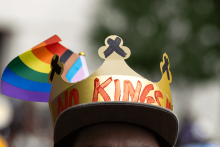
In the past week, the Trump administration brokered a deal that secured the release of Israeli hostages and Palestinian prisoners. While the terms of the long overdue ceasefire are being contested, this is a groundbreaking accomplishment for which I’m deeply thankful. But this short-term peacemaking victory abroad was quickly undermined by the administration’s bellicose rhetoric and actions at home.
President Donald Trump has repeatedly abused his ability to declare emergencies and seize power under the pretense of maintaining law and order. For example, he declared immigration emergencies to further militarize the U.S.-Mexico border and label drug cartels terrorists; he declared a “trade emergency” to justify and impose costly tariffs; and he declared an energy emergency to greenlight new drilling projects and ignore regulations. Most alarmingly, he has falsely declared a “crime” emergency to federalize and deploy National Guard troops to additional cities.
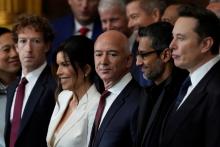
Are billionaires the reason we can’t have nice things? It’s tempting to think so.
Consider Elon Musk, having been messily ejected from President Donald Trump’s orbit after his DOGE project ended in failure, with little to show for it other than an appalling and growing body count. Or Jeff Bezos, whose reported interference with The Washington Post has helped reduce the one-time standard bearer of ferocious journalism to a husk of its former glory.
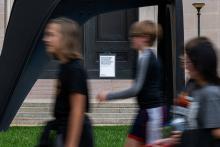
As we enter the second week of the government shutdown, paychecks are on hold, flights are being delayed, and the political blame game is in full swing. One way or another, it will end when legislators do what they failed to do in the first place: Pass a spending bill.
Until that happens, I find it’s easy to get lost in the political soup of it all. A nonstop churn of pundits bid for the best take on what the shutdown means, which party will be held responsible, and whether a new spending bill even matters if Congress won’t do its job and enforce. Politicians point fingers, the president posts a racist deepfake, and Washington, D.C.’s bars roll out themed “unhappy hour” menus with discounts for furloughed workers. A round of “Continuing Rye-solutions,” anyone?

I first learned about the theological concept of kairos while studying abroad in Cape Town, South Africa in 1996. South African faith leaders taught me that, as compared to chronos, or time as we know it and traditionally experience it, kairos moments are precipitated by times in which our current reality becomes so pernicious and fraudulent that God can create a moment of opportunity for propitious action and transformation.
As I think about the alarming things we’ve seen in the U.S. this year—eviscerated foreign aid, a gutted federal workforce, tax cuts for the 1% at the expense of Medicaid and food stamps, National Guard troops deployed against U.S. cities, indiscriminate immigration raids, an almost complete retreat on addressing our climate crisis, attacks on media outlets and free speech, and other tactics that mirror authoritarian regimes—I’m increasingly sensing that we are in the midst of a kairos moment. Further signs came to a head this past week with the horror of five mass shootings in one weekend, a costly government shutdown, and an alarming and bizarre summoning of 800 generals and admirals to the White House in which President Donald Trump pledged to dangerously misuse the military to come after the “enemy from within.”
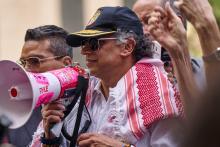
I’ll be honest, I always thought the prophet Isaiah’s “woe to those who call evil good and good evil,” would play out a little more subtly in modern politics. Instead, last week gave us two explicitly straightforward examples of intentional, unjust redefinitions.
On Sept. 25, state Rep. John Gillette, a Republican from Kingman, Ariz., said earlier in the week that U.S. Rep. Pramila Jayapal, a Democrat from Washington state, should be “tried convicted and hanged.” After the Arizona Mirror reported on his comments, Gillette said he was simply referencing the “longstanding statutory penalty for treason.” But Jayapal, as the Mirror reported, was not calling for treason or a violent overthrow. Instead, she had been advocating for nonviolent resistance and protests. In a review of the entire session, the Mirror found there were “no calls to violence or advocating for overthrowing the government.”

You may have heard that, at Charlie Kirk’s memorial service, Erika Kirk said that she forgave her husband’s assassin.
You may have also heard that only a few minutes later, President Donald Trump said that while Charlie Kirk “did not hate his opponents—he wanted the best for them,” he was different: “I hate my opponent, and I don’t want the best for them!” This moment got a lot of attention, understandably so, but another moment stuck out to me even more. And even though we’re almost a week and a half removed from the memorial service, I think it’s still worth exploring today.
In a short few months, I will pass a milestone and move into my sixth year of publicly living out my transgender identity. The years have indeed brought external changes—a deepened voice, new growth of facial hair, and a visible confidence. But more importantly, I finally know true happiness and peace.
In August, at least 20 people were killed in an Israeli attack on Nasser Hospital in southern Gaza. According to MSNBC, Israel struck the hospital at least four times, killing journalists, health workers, and emergency response personnel, many of whom were responding to the initial round of bombings.

“On Sunday, Erika Kirk forgave the man who shot her husband,” Jimmy Kimmel told his live studio audience on Tuesday night, his first show back after a six-day suspension following his musings on Charlie Kirk’s assassination. “She forgave him.”
“That is an example we should follow,” Kimmel continued, his voice cracking with emotion. “If you believe in the teachings of Jesus, as I do, there it was. That’s it. A selfless act of grace, forgiveness from a grieving widow that touched me deeply. And if there’s anything we can take from this tragedy, I hope it’s that.”
When a Texas Republican congressional candidate used a flamethrower to set a Quran ablaze as part of a political ad in August, I wasn’t shocked by the act itself.
Unfortunately, burning the Quran as a political act has a long history. What made my heart sink was hearing the candidate claim the fire was “powered by Jesus Christ.”

Last week the Trump administration announced Operation Midway Blitz, which extends the surge of ICE agents sent to Los Angeles and Washington, D.C., into Chicago; additional ICE surges are happening in Boston and are planned for Memphis. This increased ICE activity follows an alarming Supreme Court shadow docket ruling that permits the administration to stop people on the basis of personal appearance, language, or type of employment. In other words, racial profiling is now explicitly permissible for immigration officials.
If your life is proceeding basically as normal—school drop-offs, daily commutes, medical appointments, visits with grandchildren, stressful jobs, or the daily rhythms of life—it can be hard to remember the fear that many of our immigrant neighbors now feel. Despite my job leading a social justice organization, I’ll confess that I’m not immune from the temptation myself.
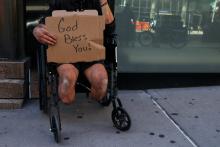
Romans 13:1, much to my chagrin, reads, “Let everyone be subject to the governing authorities, for there is no authority except that which God has established. The authorities that exist have been established by God.”
I’ve been on the receiving end of a pointed quotation of this passage more than once; usually when I’ve questioned the governance of a particular leader or advocated for someone who has broken a law. But all too often, these words seem to vanish from my critics’ memories when their preferred leader is out of power. The Bible is decidedly nuanced in its opinions on this matter.
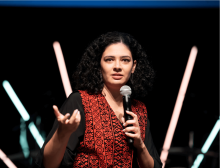
Last weekend, I visited my home state of Illinois to attend the Church at the Crossroads conference, which was held at Parkview Community Church in Glen Ellyn. Conference organizers estimated that 580 attended in person and 300 more joined virtually. The conference was convened to encourage American evangelicals to listen to Palestinian Christians and to confront and correct those who use scripture to “justify war, occupation, or silence” in the face of the escalating violence in Israel and Palestine.
Practically speaking, though, what was the point of this shindig?

A federal judge has ordered the closure of the notorious immigration detention center known as “Alligator Alcatraz,” citing environmental violations and opposition from the Miccosukee Tribe. Progressives are celebrating this as a significant triumph for Florida’s Everglades, Indigenous communities, and the migrants who have endured the detention center’s conditions. But is this court ruling truly the sweeping victory that advocates claim?
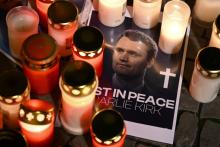
I read the news, stepped into my car, and let out a guttural scream.
Charlie Kirk, 31, had been shot and killed while speaking at Utah Valley University.

The brazen and reprehensible murder of right-wing religious movement leader Charlie Kirk, a co-founder of Turning Point USA and a key supporter of President Donald Trump, is as tragic as it is telling about the sad state of American politics.
The 31-year-old husband and father of two died after being shot while he conducted a popular debate-style event at Utah Valley University, south of Salt Lake City. Kirk had started answering a question about gun violence in America when a single bullet struck him in the neck. Republican and Democratic spokespersons, including Trump, asked for prayers as medical professionals tried to save Kirk's life, but he succumbed to his wounds shortly after the attack.
As part of the ongoing assault on essential services for the most vulnerable, the One Big Beautiful Bill Act, signed into law on July 4, includes $1 trillion in cuts to Medicaid over the next 10 years. As Emily Crawford noted for NPR in August, “The Congressional Budget Office estimates that these cuts could cause 10 million Americans to lose health insurance by 2034.”
As a caregiver for my disabled mother, who relies solely on Medicaid for health insurance, these estimates are terrifying. Also terrifying is that House Speaker Mike Johnson, the Louisiana Republican and Christian, gave glory to God when the bill that created these cuts was passed.
In many headlines and on social media, the term “evangelical” is often conflated with “conservative,” “white,” “male,” and “American.” Many in the U.S. evangelical community are resisting that conflation, actively pushing for a new vision for evangelicalism that situates it within a global landscape. For these evangelicals, the future of evangelicalism is less James Dobson and more Botrus Mansour.
As such, Christianity Today often uplifts the multicultural face of global evangelicalism, suggesting that decentering the white American experience offers a new path forward for evangelicalism. Hence, the oft spoken refrain: The new face of Christianity is not a white man, but a woman in Africa.
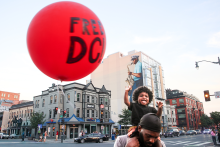
When President Donald Trump announced a takeover of the nation’s capital in August, he justified the move by claiming that crime in Washington, D.C., was rampant. It wasn’t.
Many videos have surfaced on social media depicting law enforcement officers from multiple agencies targeting predominantly Black and brown neighborhoods while outraged bystanders berate the officers.